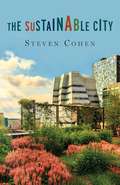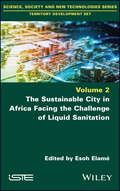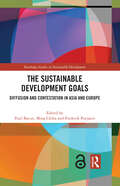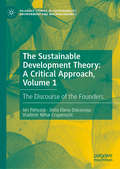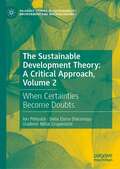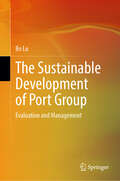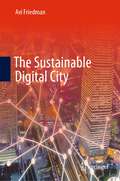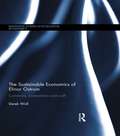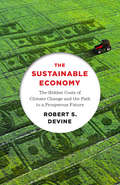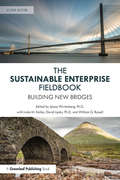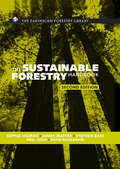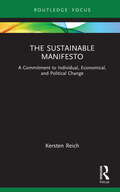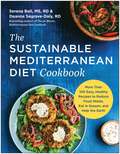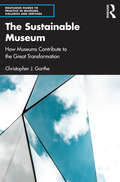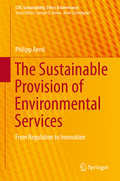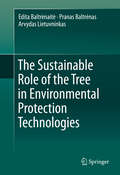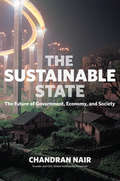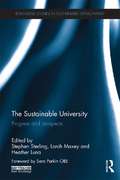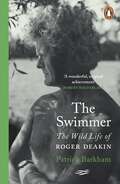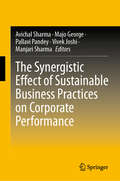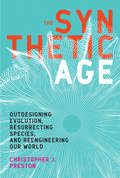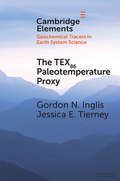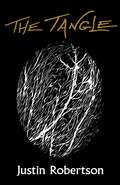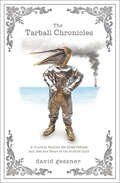- Table View
- List View
The Sustainable City
by Steven CohenLiving sustainably is not just about preserving the wilderness or keeping nature pristine. The transition to a green economy depends on cities. For the first time in human history, the majority of the people on the planet live in urban areas. If we are to avert climate catastrophe, we will need our cities to coexist with nature without destroying it. Many places are already investing in the infrastructure of the future—including renewable energy, energy efficiency, mass and personal transit, and advanced sewage and waste management—but the modern city still has a long way to go.In The Sustainable City, Steven Cohen provides a broad and engaging overview of the urban systems of the twenty-first century, surveying policies and projects already under way in cities around the world and pointing to more ways progress can be made. Cohen discusses the sustainable city from an organizational-management and public-policy perspective that emphasizes the local level, looking at case studies of existing legislation, programs, and public-private partnerships that strive to align modern urban life and sustainability. From waste management in Beijing to energy infrastructure in Africa to public space in Washington, D.C., there are concrete examples of what we can do right now. Cohen synthesizes the disparate strands of sustainable city planning in an approachable and applicable guide that highlights how these issues touch our lives on a daily basis, whether the transportation we take, where our energy comes from, or what becomes of our food waste. Providing recommendations and insights with immediacy and relevance, this book has invaluable lessons for anyone seeking to link public policy to promoting a sustainable lifestyle.
The Sustainable City in Africa Facing the Challenge of Liquid Sanitation
by Esoh ElaméThis book questions the role of liquid sanitation in the development of cities in Africa. The absence of sewerage networks and treatment plants in African cities already submerged by rapid and anarchic urbanization is a major problem. To meet this challenge, it is urgent to rethink urban water governance and impose and enforce sustainable urban planning standards. In other words, sanitation issues must now be placed at the heart of urban planning.
The Sustainable Development Goals: Diffusion and Contestation in Asia and Europe (Routledge Studies in Sustainable Development)
by Paul Bacon Frederik Ponjaert Mina ChibaThere have been significant efforts to implement the Sustainable Development Goals (SDGs) at multiple levels of governance across all regions of the world. However, the manner in which the global governance norms underlying the SDGs are actually being diffused is under-researched and not well understood. This book considers the promotion of the SDGs through the lens of norm diffusion theory, with a focus on three SDG policy areas; health, education and decent work. A distinctive feature of the book is that it offers multiple original case studies of SDG norm diffusion involving Asian and European actors. A unique feature is that the case studies in the book identify relevant SDG norm senders and norm receivers, and examine the relationship between them. The book also challenges the assumption that the SDGs themselves are static and unchanging, and reveals how SDG norms are dynamic and can be reformulated as a result of contestation between norm senders and norm receivers. As well as introducing a diverse and original set of case studies, the book therefore allows readers to deepen their understandings of the policy diffusion mechanisms by which SDGs are diffused, and grasp the patterns of success and failure in the implementation of these policies.
The Sustainable Development Theory: The Discourse of the Founders (Palgrave Studies in Sustainability, Environment and Macroeconomics)
by Delia Elena Diaconaşu Vladimir Mihai Crupenschi Ion PohoațăThis book argues that the theory of sustainable development lost some of its rigor because of two main reasons. The first manifests itself as an inflation of concepts that hampers the correct understanding of sustainability’s essence. The second one consists of a departure from the traditional scientific sources of the classicists and, in part, neoclassicists. Exploiting relevant areas of their works, the authors outline the theoretical framework necessary to promote a healthy version of sustainability. Of utmost interest prove to be areas such as: the formation process of natural prices and natural rate of interest; placing growth before employment and placing production before distribution, consumption, and social justice. The main idea of the book consists of a call for breaking away from the impure forms of the theory of sustainable development and its reconstruction through the reconciliation with the laws of healthy growth as they are highlighted in the works of the founders. The authors make the case for an approach to sustainable development that is holistic, macroeconomic, and institutionalist, where social, ecological, and economic components are reconciled. This work presents a fresh perspective in the context of current works on sustainability, serving as an accessible research resource and public policy decision guide.
The Sustainable Development Theory: When Certainties Become Doubts (Palgrave Studies in Sustainability, Environment and Macroeconomics)
by Ion Pohoaţă Delia Elena Diaconaşu Vladimir Mihai CrupenschiThis book explores the present conflictual relationship between the economy, the environment, and society. The current mainstream economic model is analysed from the perspective of the founding economists to review its suitability to tackle issues of sustainable development. The problems of redistribution and social justice are debated at length; alongside those concerning the giant state, degrowth, and a vision of sustainability that is founded on the idea of a self-regulating free market economy. Business cycle sustainability, anti-crisis therapy, technological unemployment, the natural rate of interest, and the Bruntland matrix are also examined.This book aims to present a holistic approach to sustainable development where social, ecological, and economic components are balanced. It will be relevant to students and researchers interested in this topic.
The Sustainable Development of Port Group: Evaluation and Management
by Bo LuThis book primarily focuses on the coordinated development of port groups and the environment. It extensively reviews relevant literature and draw on existing theoretical research achievements to analyze the mechanisms and influencing factors behind the formation of green, ecological, or energy-saving ports. It employs attribution decomposition analysis and LMDI decomposition methods to identify driving forces and factors for low-carbon ports. Furthermore, with the goal of minimizing the comprehensive cost of low-carbon port investment and considering constraints such as the upper limit of low-carbon investment in ports, the book utilizes tools such as stochastic processes and optimization decision theory to establish an optimization model for carbon emission reduction investment in low-carbon ports, aiming to find the best investment solution. Throughout the process, the book employs a combination of quantitative and qualitative analysis methods and provides corresponding recommendations and suggestions from an industry and port perspective through comparative analysis and case studies.
The Sustainable Digital City
by Avi FriedmanThis book explores the rise of technology-centered urban planning and the diffusion of these practices around the world. Seven axes of urban planning have been selected to highlight how data and technology currently work and how these systems can be improved going forward. Each aspect is explored in its own chapter that combines narrative description, illustrations, and case studies to show how technology currently shapes our cities and how this may impact the urban environments. Topics include infrastructure, mobility, energy use and distribution, work, public health, and knowledge transfer among others. The book also demonstrates how these aspects are tied to and affect the four pillars of sustainability: environment, society, economy, and culture.
The Sustainable Economics of Elinor Ostrom: Commons, contestation and craft (Routledge Studies in Ecological Economics #33)
by Derek WallElinor Ostrom’s Nobel Prize-winning work on common pool property rights has implications for some of the most pressing sustainability issues of the twenty-first century — from tackling climate change to maintaining cyberspace. In this book, Derek Wall critically examines Ostrom’s work, while also exploring the following questions: is it possible to combine insights rooted in methodological individualism with a theory that stresses collectivist solutions? Is Ostrom’s emphasis on largely local solutions to climate change relevant to a crisis propelled by global factors? This volume situates her ideas in terms of the constitutional analysis of her partner Vincent Ostrom and wider institutional economics. It outlines her key concerns, including a radical research methodology, commitment to indigenous people and the concept of social-ecological systems. Ostrom is recognised for producing a body of work which demonstrates how people can construct rules that allow them to exploit the environment in an ecologically sustainable way, without the need for governmental regulation, and this book argues that in a world where ecological realities increasingly threaten material prosperity, such scholarship provides a way of thinking about how humanity can create truly sustainable development. Given the inter-disciplinary nature of Ostrom’s work, this book will be relevant to those working in the areas of environmental economics, political economy, political science and ecology.
The Sustainable Economy: The Hidden Costs of Climate Change and the Path to a Prosperous Future
by Robert DevineAn original, engaging guide to creating a sustainable economy that will combat global warming while also improving our quality of life.Pick an environmental issue. Maybe air pollution, toxic waste, or deforestation. These all seem like solid choices, but none of these is actually an environmental problem--at least, not at its heart. Deep down, they are economic problems. Nearly all the issues we classify as environmental stem from defects in the DNA of America's current market system. This is emphatically true of our greatest environmental threat: global warming.With a focus on climate change, journalist and author Robert S. Devine reveals the fundamental flaws in the economy that enable environmental degradation. The Sustainable Economy is a book about economics, but it skips the equations and eases through the jargon, opting instead for compelling stories and surprising humor. Readers will encounter high-tech narwhals, struggling coal workers, orbiting giant mirrors, the kids who are suing the U.S. government over climate policy, and vanishing Alaskan towns.The Sustainable Economy looks at many of the most pressing climate issues, such as melting ice caps and farm-killing droughts, but by viewing them through the revealing lens of economics, the book delivers a fresh perspective. Devine shows how the basic mechanisms of supply and demand fail when it comes to global warming and the environment. Fortunately, he also lays out a path to an improved economy that can boost our well-being while also fostering a healthy environment. Most importantly, The Sustainable Economy shows how we can overcome the political and personal obstacles blocking progress toward a sustainable, just, and prosperous economy.
The Sustainable Enterprise Fieldbook: Building New Bridges
by David Lipsky Jeana Wirtenberg Linda M. Kelley William G. RussellWith deep thought and inspiring examples, this updated book engages readers by increasing their understanding and awareness of what sustainability means conceptually, practically, personally, and professionally. It provides readers with the tools and techniques to improve the social, environmental, and economic performance of their organizations in both the short and long term. Since sustainability is not achieved in a siloed environment, everyone has a critical role to play on this journey. The Sustainable Enterprise Fieldbook engages today’s managers and leaders of organizations, in both the private sector and civil society, who are being challenged as never before to find ways to play a proactive role in understanding and addressing the risks and opportunities of sustainability. It teaches them how to apply systems thinking to turn our most intractable problems into exciting business opportunities, and offers ground breaking frameworks in new chapters on globalization, strategy, metrics, and sustainability models for collaboration, technology, and community. That is why this book is structured to be a fieldbook to provide practitioners the Activities, Cases, and Tools that they can use to help move their enterprise through progressively higher performing stages of sustainability. Readers will also gain access to the innovative Living Fieldbook: an online community forum filled with supporting materials.
The Sustainable Forestry Handbook: A Practical Guide for Tropical Forest Managers on Implementing New Standards (The\earthscan Forest Library)
by Ruth Nussbaum Stephen Bass James Mayers Neil Judd Sophie HigmanThe Sustainable Forestry Handbook is widely considered to be the essential aid to understanding and implementing sustainable forest management. Providing a clear and concise guide to the practicalities of implementing international standards for sustainable forest management, this fully updated second edition covers new Forest Stewardship Council requirements, High Conservation Value Forests, clearer requirements on pesticides and developments in policy and forest governance. Aimed at forest managers, and employing extensive cross referencing and easy-to-understand illustrations, this highly practical handbook explains in clear terms what the standards require forest managers to do and how they might go about implementing them.
The Sustainable Manifesto: A Commitment to Individual, Economical, and Political Change (Routledge Focus on Environment and Sustainability)
by Kersten ReichIn The Sustainable Manifesto, Kersten Reich describes in a concise and memorable way the necessary actions that humans need to take to live sustainably and combat climate change. Are we sufficiently capable of changing our behaviour towards sustainability? What do we have to do in a more sustainable way, and how? The Sustainable Manifesto considers questions around behaviour-change and action for sustainability and connects this thinking to current research in both the natural and human sciences. Reich begins by addressing the most important risks to sustainability and looks in particular at climate change, biodiversity, land use and global phosphorus and nitrogen cycles. He goes on to identify the main causes that have led to the current crisis: specifically the human desire for expansion, growth in all areas, progress and competitive advantages that have forced consideration of the common good into the background. In this vein, the author highlights how economics and politics are two driving forces for which sustainability is difficult to comprehend, going against their basic principles of a liberal and now neo-liberal expansion of all markets. Finally, Reich demonstrates how sustainability could be possible if we reprioritize our life goals and face the reality of an ecological crisis and the necessary transformation of society in order to save our planet. Innovative and accessible, this book will be of interest to students and researchers of sustainability, theories of learning, human behaviour, as well as those who are looking for answers on how to fight for a sustainable future.
The Sustainable Mediterranean Diet Cookbook: More Than 100 Easy, Healthy Recipes to Reduce Food Waste, Eat in Season, and Help the Earth
by Deanna Segrave-Daly Serena BallMouthwatering, budget-friendly recipes that are good for you and good for the Earth, from the authors of The 30-Minute Mediterranean Diet Cookbook Food-loving dietitians and culinary instructors Serena Ball and Deanna Segrave-Daly are back, serving up delicious climate cuisine with a Mediterranean spin. The science is clear: a Mediterranean-style diet is one of the healthiest and most sustainable in the world. The Sustainable Mediterranean Diet Cookbook is a comprehensive guide to getting the most from this incredible regimen, with 10 steps to a more eco-friendly kitchen including helpful guidance on more sustainable ingredient choices, energy-saving cooking methods, smarter storage, and food waste reduction. If you can&’t do all 10, don&’t worry! Making even a few of these small changes can add up to a big impact on the health of the planet. Recipes include: Tahini Swirl Yogurt Parfait with Grapes Broiled Halloumi with Mint Cucumber Salad Cheesy Broccoli and Greens Soup with Za&’atar (or Any Day Bouillabaisse) Mascarpone Scrambled Eggs with Carrot Bacon Turkish Tomato Flatbread Falafel with Pickled Herb Spread Little Fishes Red Pepper Potato Cakes OR Spicy Fish Shawarma Bowl Smoked Seafood Farro Risotto North African Chicken Couscous Bowls Parsley Pistachio Beef Bulgur Koftas Baklava Frozen Yogurt Bark Olive Oil Polenta Berry Cakes Each recipe includes detailed nutritional information, as well as helpful ingredient substitutions, prep tips, and time-saving suggestions. Recipes were triple-tested by real home cooks and are adaptable for gluten-free, dairy-free, egg-free, nut-free, vegetarian and vegan lifestyles. Meat and seafood lovers will also find approachable ways to make more eco-conscious choices. With beautiful, inspiring full-color photographs throughout, this cookbook is an indispensable resource for a climate-friendly kitchen.
The Sustainable Museum: How Museums Contribute to the Great Transformation (Routledge Guides to Practice in Museums, Galleries and Heritage)
by Christopher J. GartheThe Sustainable Museum is the first book to outline a coherent strategy for the direction of museums, as it relates to sustainability in the museum and heritage sector. Arguing that museums must place sustainability at the centre of all their activities, if they are to become key actors with a clear societal role, Garthe considers the issues that museums will likely face as they take on their new roles. Presenting case studies from a wide range of museums around the world, the book considers different ways of implementing sustainability in different types and sizes of institutions. Whilst the book clearly outlines the need for change, it also provides guidance about how to change. Garthe does this by considering specific concepts and approaches to sustainability in relation to the different aspects of museum operations. The book includes a hands-on manual for implementing sustainability management in a museum, whilst also considering the challenges practitioners will encounter and considering what the future of the sustainable museum might look like. The Sustainable Museum will be essential reading for museum and heritage professionals around the globe. The book will also be of interest to academics and students engaged in the study of museums, arts and cultural management, business administration, change management or sustainable development.
The Sustainable Provision of Environmental Services
by Philipp AerniThis book addresses the ability of market-based instruments to improve the sustainable provision of environmental services. The author combines field research and insights from the multi-stakeholder dialogue at the FAO to analyze the gap between the predictions provided by theory and the corresponding outcomes in practice. In particular, the author challenges the theory behind Payments for Environmental Services (PES), a concept derived from neoclassical welfare economics, by demonstrating that PES projects often lack financial sustainability unless local entrepreneurs make use of the resulting new networks to create innovative markets for environmental goods. The author calls for a shift of focus from regulation to innovation in projects and policies designed to improve the provision of environmental services. Its spotlight on the positive social impacts of companies that engage in hybrid PES schemes will make the book appealing to practitioners and policymakers alike.
The Sustainable Role of the Tree in Environmental Protection Technologies
by Edita Baltrėnaitė Pranas Baltrėnas Arvydas LietuvninkasThis monograph describes ways of using trees and their byproducts in environmental protection technologies and methodologies throughout their lifecycles. The tree, the planet's main source of biomass, is an indispensable tool for sustainable technologies, and the authors present a holistic picture of how and why in this volume. The authors describe the indispensable role of the living tree in phytoremediation and biomonitoring and detail the relationship of the tree with its surrounding ecosystem. The direct and indirect relationships of a tree at its vegetation period with various components of the ecosystem (i. e. atmosphere, hydrosphere, lithosphere and soil) contribute to the role of a tree as the medium for integrating aerogenic and edaphic pollutants. Trees phytostabilize pollutants in their organisms and remove them from the soil. The ability of some species of trees to reflect the quality of the environment makes a basis for the environmental bioindication, while quantitative representation of the chemical composition of the surrounding environment allows for the use of trees in biomonitoring. Morphological features of trees (e. g. annual tree rings) allow us to observe environmental conditions in the past and retrospectively evaluate them. This monograph also details how wood products (e. g. biochar, chips, bark, etc. ) of a tree after it has died are used in environmental technologies. Due to the specific morphological form and physical and chemical composition of wood products, they may be used as active materials in the technologies aimed at reducing pollution in an effective and sustainable manner.
The Sustainable State: The Future of Government, Economy, and Society
by Chandran NairThe free-market, limited government development model has been an ecological and social disaster for the developing world. Sustainable and equitable development is only possible with the active involvement of a strong central state that can guide the economy, protect the environment, and prioritize meeting their people's basic needs. In this sure to be controversial book, Chandran Nair shows that the market-dominated model followed by the industrialized west is simply not scalable. The United States alone, with less than five percent of the world's population, consumes nearly a quarter of its resources. If countries in Asia, where 60% of the world's population lives, try to follow the Western lead, the results will be calamitous. .Instead, Nair argues that development must be directed by a state that is willing and able to intervene in the economy . Corporations, which by design demand ever-expanding consumption, need to be directed towards meeting societal needs or otherwise restrained, not unleashed. Development has to be oriented towards the greatest good—clean drinking water for the many has to take precedence over swimming pools for the few. He provides three compelling case studies demonstrating the benefits of such strong state governance and the findings of weak state governance.This will mean rethinking the meaning of concepts like "prosperity," "freedom," and "rights," and whether democracy is always the best way to ensure responsive government—as Nair writes, "A democracy that cannot work to improve the life of its citizens is not better than a non-democracy that can actually improve quality of life." Many people will find these to be challenging ideas, but what Nair offers is a model suited to the realities of the developing world, not the assumptions of the dominant culture.
The Sustainable University: Progress and prospects (Routledge Studies in Sustainable Development)
by Stephen Sterling Larch Maxey Heather LunaThe direction of higher education is at a crossroads against a background of mounting sustainability-related issues and uncertainties. This book seeks to inspire positive change in higher education by exploring the rich notion of the sustainable university and illustrating pathways through which its potential can be realised. Based on the experience of leading higher education institutions in the UK, the book outlines progress in the realisation of the concept of the ‘sustainable university’ appropriate to the socioeconomic and ecological conditions facing society and graduates. Written by leading exponents of sustainability and sustainability education, this book brings together examples, insight, reflection and strategies from the experience of ten universities, widely recognised as leaders in developing sustainability in higher education. The book thus draws on a wealth of experience to provide reflective critical analysis of barriers, achievements, strategies and potential. It critically reviews the theory and practice involved in developing the sustainable university in a systemic and whole institutional manner, including the role of organisational learning.While remaining mindful of the challenges of the current climate, The Sustainable University maps out new directions and lines of research as well as offering practical advice for researchers, students and professionals in the fields of management, leadership, organisational change, strategy and curriculum development who wish to take this work further.
The Swimmer: The Wild Life of Roger Deakin
by Patrick BarkhamBEST BOOK OF 2023 ACCORDING TO THE NEWSTATESMAN AND OBSERVER'The Swimmer is a wonderful, original achievement; teeming with stories, glittering with images, and experimental in form and tone' Robert MacfarlaneRoger Deakin, author of the immortal Waterlog, was a man of many parts: maverick ad-man, cider-maker, teacher, environmentalist, music promoter and filmmaker. But, above all, he was the restorer of ancient Walnut Tree Farm in Suffolk, the heartland where he wrote about all natural life – with rare attention, intimacy, precision and poetry.Roger Deakin was unique, and so too is this joyful work of creative biography, told primarily in the words of the subject himself, with support from a chorus of friends, family, colleagues and lovers. Delving deep into Deakin’s library of words, Patrick Barkham draws from notebooks, diaries, letters and recordings to conjure his voice back to glorious life in these pages.'A rich, strange and compelling work of creative memoir that beautifully honours and elevates the life and work of its subject' Alex Preston, Observer
The Synergistic Effect of Sustainable Business Practices on Corporate Performance
by Manjari Sharma Avichal Sharma Majo George Pallavi Pandey Vivek JoshiThis book explores the intricate relationship between sustainable business practices and economic performance. By examining how companies can achieve financial benefits through the integration of environmental and social responsibility into their core strategies, this book seeks to bridge the gap between environmental and economic concerns. It demonstrates that sustainability is not merely a moral imperative but a strategic economic driver in the modern business landscape. The book provides valuable insights into how companies can align their economic goals with environmental and social responsibilities, leading to long-term financial success. Readers will also benefit from the practical applications and case studies that demonstrate the tangible financial benefits of sustainable business practices. Additionally, the book serves as a resource for implementing sustainability strategies within organizations, making it an indispensable guide for business leaders, policymakers, and academics seeking to navigate the complexities of modern economic and environmental challenges.
The Synthetic Age: Outdesigning Evolution, Resurrecting Species, and Reengineering Our World (The\mit Press Ser.)
by Christopher J. PrestonImagining a future in which humans fundamentally reshape the natural world using nanotechnology, synthetic biology, de-extinction, and climate engineering.We have all heard that there are no longer any places left on Earth untouched by humans. The significance of this goes beyond statistics documenting melting glaciers and shrinking species counts. It signals a new geological epoch. In The Synthetic Age, Christopher Preston argues that what is most startling about this coming epoch is not only how much impact humans have had but, more important, how much deliberate shaping they will start to do. Emerging technologies promise to give us the power to take over some of Nature's most basic operations. It is not just that we are exiting the Holocene and entering the Anthropocene; it is that we are leaving behind the time in which planetary change is just the unintended consequence of unbridled industrialism. A world designed by engineers and technicians means the birth of the planet's first Synthetic Age.Preston describes a range of technologies that will reconfigure Earth's very metabolism: nanotechnologies that can restructure natural forms of matter; “molecular manufacturing” that offers unlimited repurposing; synthetic biology's potential to build, not just read, a genome; “biological mini-machines” that can outdesign evolution; the relocation and resurrection of species; and climate engineering attempts to manage solar radiation by synthesizing a volcanic haze, cool surface temperatures by increasing the brightness of clouds, and remove carbon from the atmosphere with artificial trees that capture carbon from the breeze. What does it mean when humans shift from being caretakers of the Earth to being shapers of it? And in whom should we trust to decide the contours of our synthetic future? These questions are too important to be left to the engineers.
The TEX86 Paleotemperature Proxy (Elements in Geochemical Tracers in Earth System Science)
by Gordon N. Inglis Jessica E. TierneyThe TEX86 paleothermometer is based upon the distribution of archaeal membrane lipids ('GDGTs') in marine sediments. GDGTs are ubiquitous, abundant and relatively resistant to degradation; as such, the TEX86 paleothermometer has been used to reconstruct sea surface temperature (SST) during the Cenozoic and early Mesozoic. We review the principles of the TEX86 proxy and developments made over the last two decades. We also discuss its application as a paleotemperature proxy and explore existing challenges and limitations.
The Talking Earth
by Jean Craighead GeorgeBillie Wind ventures out alone into the Florida Everglades to test the legends of her Indian ancestors and learns the importance of listening to the earth's vital messages.
The Tangle
by Justin Robertson'A writer of fierce and vivid imagination. The Tangle, like Holdstock's classic Mythago Wood and Catlin's The Voorh, taps the deep resonances of the wild wood in the English soul, revering even the stones as living minds, possessed of souls and ancient memories. Visceral stuff from this promising new star of dark fantasy' Michael MoorcockJustin Robertson's debut novel is a trans- dimensional trip into the mysterious knot of nature; a journey into the 'brilliant darkness' where the timeless divine spirit of the 'Tangle' weaves its spell and all mankind's hubris is rendered insignificant by the radically non-human force of phantom ecology. Salvation, revelation and a terrible reckoning dwell in the ancient roots ...A time travelling account of what occurs when unknowable frontiers are breached and humanity finds itself, once again, lost in the woods, THE TANGLE invites us into a grotesque world of eco-horror, echoing with the spirit of writers such as Saki, Ballard, M R James, Ursula Le Guin, Brian Catling and Thomas Ligotti.
The Tarball Chronicles: A Journey Beyond the Oiled Pelican and Into the Heart of the Gulf Oil Spill
by David GessnerThis bestselling account of an environmental disaster’s aftermath offers “a firsthand look at the Gulf after the news cycle ended . . . brilliant.” —Publishers Weekly (starred review)Winner of an ASLE Book Award and a Reed AwardNamed a Top Book from the South by the Atlanta Journal-ConstitutionTraveling the shores of the Gulf from east to west with oceanographers, subsistence fishermen, seafood distributors, and other longtime Gulf residents, environmental advocate and acclaimed author of All the Wild That Remains David Gessner offers a lively, arresting account of the aftermath of the Deepwater Horizon oil spill.With The Tarball Chronicles, Gessner tells a story that extends beyond the archetypal oil-soaked pelican, beyond politics, beyond BP, and beyond other oil-spill accounts. Instead, heart on his sleeve and beer in hand, he explores the ecosystem of the Gulf as a complicated whole and focuses on the people whose lives and livelihoods have been jeopardized by the spill. With his signature combination of intellect, passion, and humor, Gessner asks how much we are willing to sacrifice for the conveniences of modern life.“Gessner has the heart and mind of an investigative journalist.” —Mobile Press-Register
